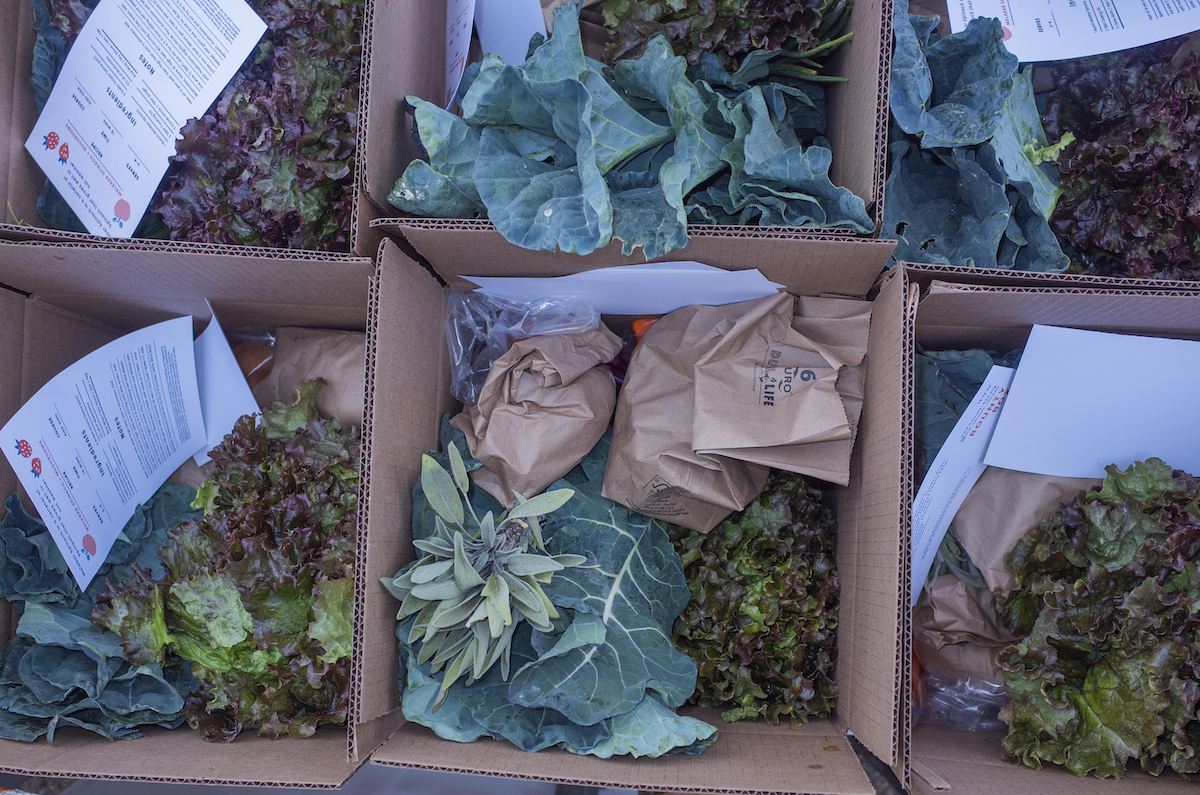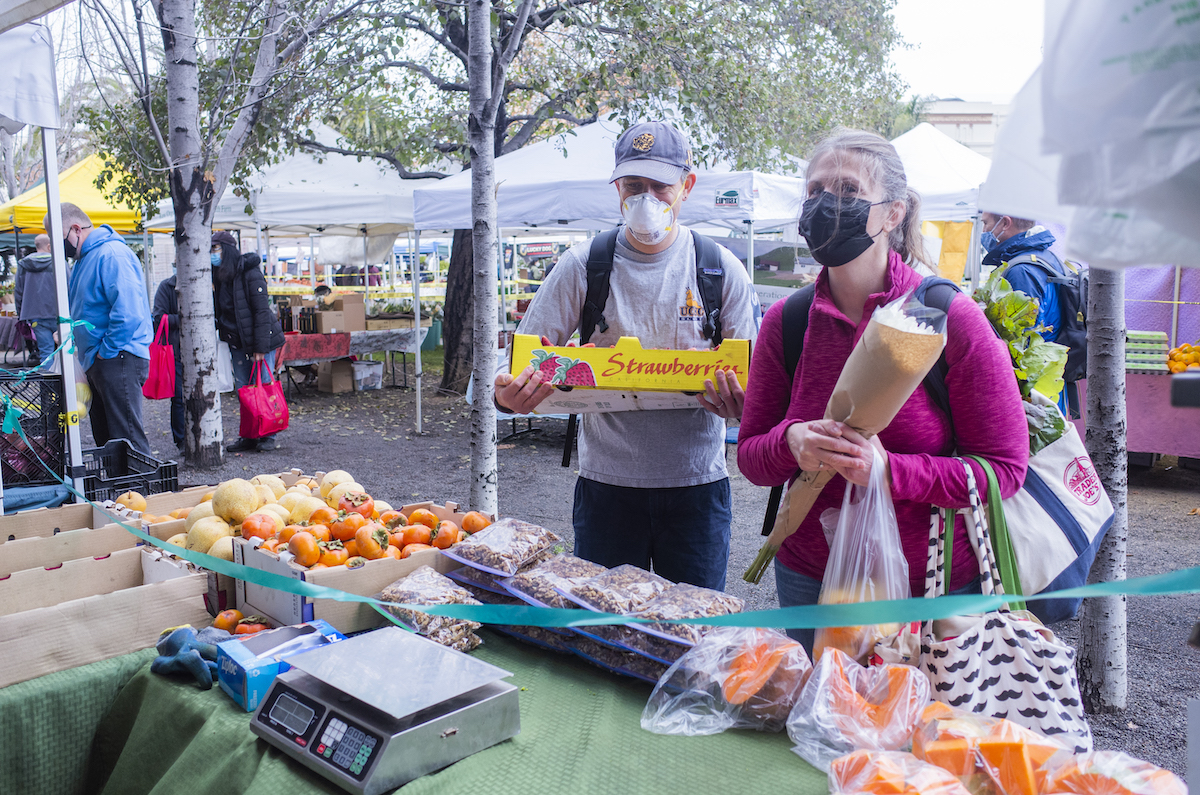Every Saturday morning, trucks loaded with fresh organic fruits, vegetables, mushrooms, nuts, and more, converge at Oakland’s Grand Lake Farmers Market. The farms that produce this bounty are located across California, and for years, a big proportion of their harvest, more than half for some farmers, was sold to restaurants. The rest was purchased by individuals shopping for their household. Restaurant closures have hit these small farmers hard. After some restaurants reopened in October, farmers thought they could breathe a sigh of relief, but a new shutdown order this month means that restaurants can only operate for takeout and delivery.
“People were just starting to eat out again and I had started to get more restaurant orders, but now with this second closure, we’re back to square one,” said Aomboon Deasy, manager of K and J Orchards, a family-run fruit farm in Yuba City.
Deasy said that before the pandemic, restaurants accounted for as much as 60% of her sales. That’s no more. During the pandemic, individual consumers have become her main customers, accounting for around 80% of sales, but this hasn’t made up for the business she lost when restaurants closed.

It’s estimated that as of July, over 300 restaurants have closed so far in the Bay Area.
Aaron Dinwoodie, the owner of Feral Heart Farm in Sunol, said he has lost about two-thirds of his income because of restaurant closures. He chose to back out of the Grand Lake Farmers Market, which he has participated in for many years, because it’s too much work now for too little profit: in addition to farming, he’s also the primary caregiver to his 13-year-old daughter.
“Farming is super hard work, and I’m not really able to pay myself. If we can’t make it, then that’s that,” said Dinwoodie, who has been a farmer for the last 16 years, and currently operates three acres of certified organic land.

But it’s not all doom and gloom. Some farmers markets have seen big increases in individuals shopping for their households.
“We’ve seen an uptick in individuals going to farmers markets. More people are staying home and cooking,” said Andy Naja-Riese, CEO of the Agricultural Institute of Marin, or AIM, which runs the Grand Lake Farmers Market, Oakland’s biggest and most well known. “We ask why now, and market customers say they feel safer shopping outdoors and also know where their food is coming from, being that there is less contact with a lot of hands.”

The Agricultural Institute of Marin is coming up with new ways for shoppers to support small farmers. One new program is what they call the “Bounty Box,” which includes fresh produce from various farmers at half price. AIM employees walk around the market collecting fruits and vegetables from farmers and they stuff a variety of things into each box, which can be picked up curbside at the market from 11 a.m. to 1 p.m. Introduced in April, the program has steadily grown in popularity with customers and farmers. Customers who pay with CalFresh, a program that gives low-income people extra purchasing power for food, get half off the already bargain $30 price.

More people are experiencing food insecurity right now because of the pandemic. According to the Agricultural Institute of Marin, there was an 87% increase in CalFresh cardholders who shopped at the market in Nov. 2020 compared to the same month last year. And over the past year, CalFresh recipients spent approximately $245,000 on the Bounty Boxes at AIM’s seven Bay Area farmers markets. Customers spent another $158,000 in Market Match incentives, which is a program that matches CalFresh dollars, on the Bounty Boxes. According to AIM, this year saw the greatest volume of EBT transactions in the history of the farmers markets.
“What we’re trying to do is support small farming operations through COVID, but we also are helping the food insecure folks. It’s a win-win situation,” said Naja-Riese. “The Bounty Boxes have really kept some of these farmers afloat throughout COVID,” said Naja-Riese.

Jesse and Shana Rigelhaupt, both Oakland residents, did not attend farmers markets in their neighborhood pre-COVID. “Now we come every week,” said Jesse. “We buy all our produce here. We want to be outside. It’s much safer, and plus everyone has masks. It’s been a lifeline for us, and it’s really shifted how we cook and eat.”
Javier Ledesma, who owns the 60-acre Ledesma Family Farm and is one of the longest participating farmers at the Grand Lake Farmers Market, said the Bounty Box program has helped a lot. “I just tell AIM what I have a surplus of at the time and it’s filling the void that restaurant sales used to have,” said Ledesma.
Ledesma Farm was one of the first certified organic farms in the Grand Lake Farmers Market, and Ledesma is one of its only Latino farm owners.
“I’m lucky,” said Ledesma. “A lot of people support me here.”

